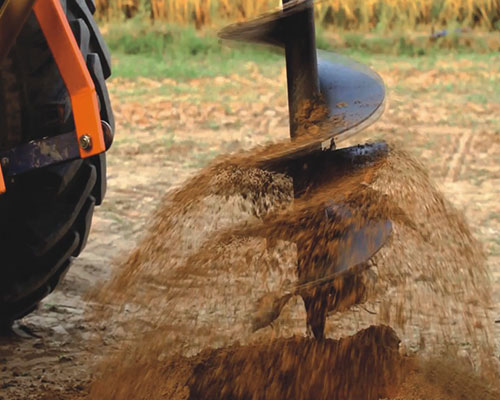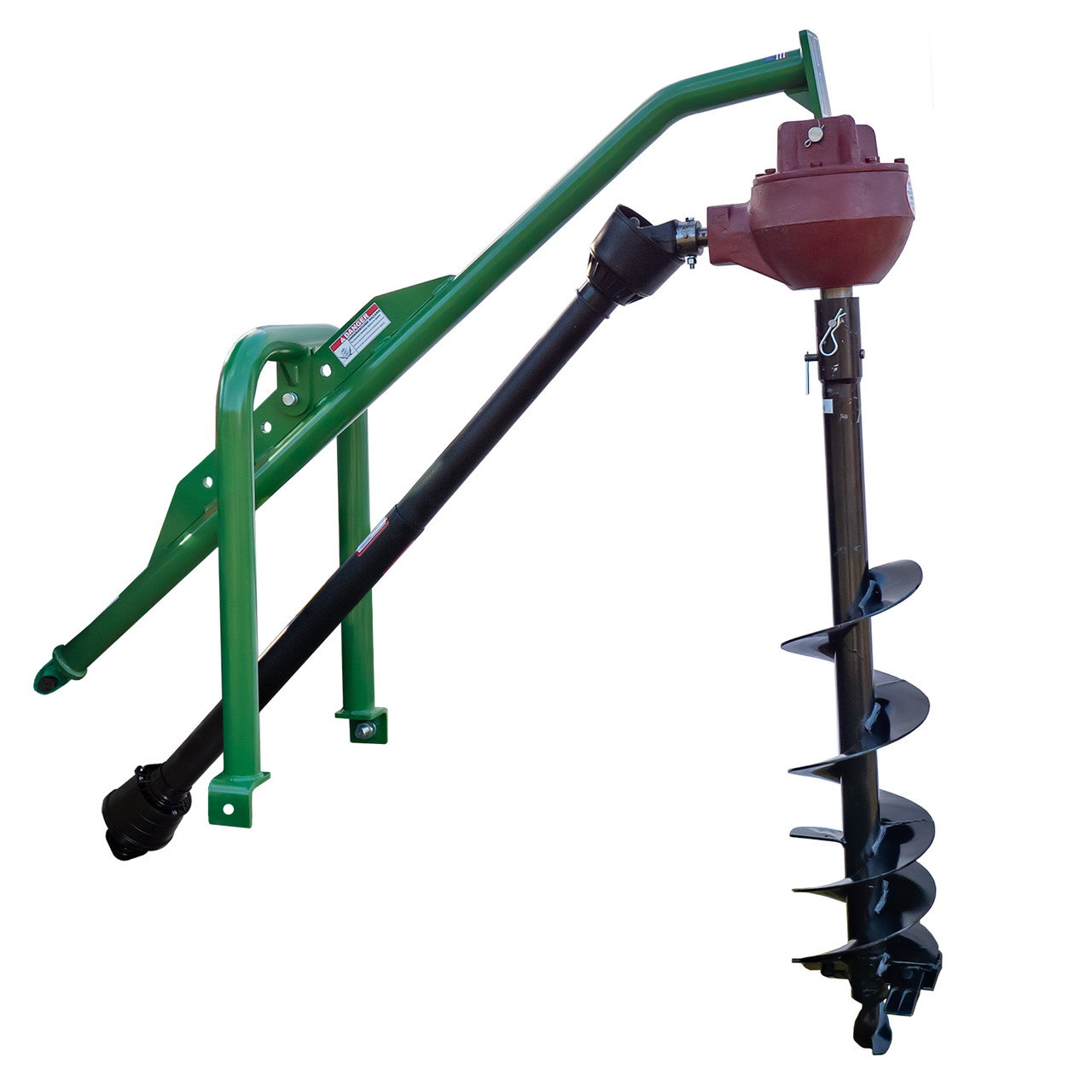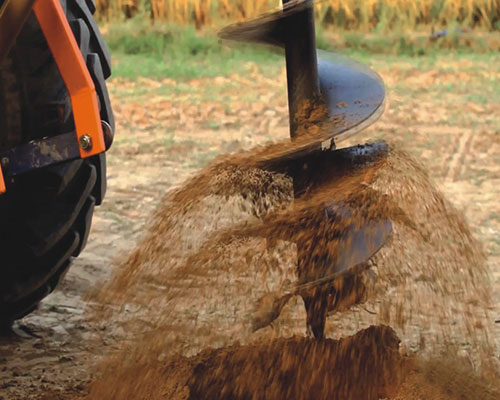Product Description
Suitable for 2 person operate, 68cc gasoline engine Earth auger . φ25mm tube , oval elbow & detachable, foldable handle design , also with dipping rubber on handle . The width of the handle is suitable for human mechanics, easy to control. The most popular package way is Earth auger with manual , tool kits and other attached accessories of the earth auger, packaged in 1 carton/ color box . Each pcs auger bit pakcage by each carton . The second popular package way is 1 pcs earth auger machine with each pcs of auger bit φ 100, 200,250mm auger bit , spring reducer , 600mm extender package in 1 carton .
Certificate : CE EMC EURO-V EPA ISO9001-2015
This machine Max drive ability : ≤ φ 300mm auger bit , but we recommend drive :≤φ 250mm auger bit . Becasue of there are more diffirent model auger bits can match with this machine. so please check earth auger bit in our website to choose the ideal model and size . then let us know , we will make offer
The offer is reference . Wellcome to contact us to talk about more detials , Such as OEM , ODM and so on
| Feature: | 2-Stroke |
|---|---|
| Bit Diameter(mm): | 300 |
| Style: | Hand-Held Earth Auger |
| Power Source: | Power |
| Model No.: | Hy-Gd680-Xk-809 |
| Patent No: | Zl 2015 3 0263756.0 |
| Samples: |
US$ 88/Box
1 Box(Min.Order) | |
|---|
| Customization: |
Available
| Customized Request |
|---|

What factors should be considered when selecting the right post hole digger for a job?
When choosing the appropriate post hole digger for a job, several factors should be taken into consideration. These factors help ensure that the selected digger is well-suited for the specific requirements of the project. Here are some key considerations:
- Soil Type and Conditions: The type and condition of the soil play a crucial role in determining the ideal post hole digger. Consider whether the soil is soft, sandy, clayey, compacted, or rocky. Different diggers have varying capabilities in handling these soil types. For example, harder soils may require more powerful motorized diggers or specialized blades, while softer soils may be manageable with manual or smaller-sized diggers.
- Project Scale and Scope: The scale and scope of the project influence the selection of a post hole digger. Determine the number of holes that need to be dug and the depth and diameter requirements of the holes. Larger projects with numerous holes may benefit from motorized diggers that offer faster and more efficient digging. Smaller projects or occasional use may warrant manual diggers for cost-effectiveness.
- Available Power Source: Consider the availability of power sources at the job site. Motorized post hole diggers typically require access to electricity or fuel, such as gas or propane. If the job site lacks these power sources, manual diggers may be a more suitable choice. Additionally, consider the portability and maneuverability of the digger if the job site is in a remote or hard-to-reach location.
- Operator Experience and Strength: Assess the experience and physical strength of the operator(s) who will be using the post hole digger. Motorized diggers are generally more powerful and require less physical effort compared to manual diggers. If the operator is inexperienced or lacks sufficient strength, it may be advisable to opt for a motorized digger to ensure efficient and safe operation.
- Budget and Cost Considerations: Set a budget for the post hole digging project and consider the cost of different digger options. Motorized diggers tend to be more expensive upfront but can save time and effort in the long run, especially for larger projects. Manual diggers are typically more budget-friendly but may require more physical exertion and time investment.
- Additional Features and Accessories: Evaluate any additional features or accessories that may be beneficial for the project. Some post hole diggers offer adjustable depth settings, ergonomic handles, or anti-vibration systems for operator comfort. Assess whether any specific accessories, such as auger extensions or sharpening tools, are available or needed for the task at hand.
By considering these factors, project managers or individuals can make an informed decision when selecting the right post hole digger. It is essential to choose a digger that matches the soil conditions, project requirements, available power sources, operator capabilities, budget, and any desired additional features or accessories.

Can post hole diggers be adapted for use in both residential and commercial projects?
Yes, post hole diggers are versatile tools that can be adapted for use in both residential and commercial projects. Their design, features, and capabilities make them suitable for a wide range of applications, regardless of the scale or nature of the project. Here are some reasons why post hole diggers can be effectively used in both residential and commercial projects:
- Size Options: Post hole diggers are available in various sizes to accommodate different project requirements. They come in compact, lightweight versions ideal for residential use, as well as larger, heavy-duty models suitable for commercial projects. The availability of different size options ensures that post hole diggers can be matched to the specific needs of the project, whether it’s a small backyard fence installation or a large-scale commercial construction project.
- Adjustable Depth and Diameter: Many post hole diggers feature adjustable depth and diameter capabilities. This adaptability allows users to customize the digging parameters based on the specific project requirements. Whether it’s digging shallow holes for residential fence posts or deeper holes for commercial applications such as signposts or structural supports, post hole diggers can be adjusted to meet the desired depth and diameter specifications.
- Soil Compatibility: Post hole diggers are designed to handle various soil types commonly encountered in both residential and commercial projects. They can effectively dig holes in soil compositions such as clay, loam, gravel, or sandy soils. This versatility ensures that post hole diggers can be used in different geographical locations, whether it’s a residential backyard or a commercial construction site.
- Portability: Post hole diggers are generally designed to be portable and easy to transport. They can be maneuvered and operated in different project locations, whether it’s a residential property or a commercial worksite. The portability of post hole diggers allows for flexibility and convenience in tackling various projects, making them suitable for both residential and commercial applications.
- Efficiency and Time Savings: In both residential and commercial projects, efficiency and time savings are essential. Post hole diggers offer significant advantages in this regard. Their mechanical action, whether manual or powered, allows for faster and more efficient digging compared to manual methods. This translates to time savings and increased productivity, benefiting both residential homeowners and commercial contractors.
- Multiple Applications: Post hole diggers have multiple applications beyond residential or commercial projects. They can be utilized in various industries such as agriculture, landscaping, and construction. Their versatility makes them valuable tools for tasks like planting trees, installing poles, erecting signs, or setting up outdoor structures. This wide range of applications further highlights the adaptability of post hole diggers across different project types and sectors.
Overall, post hole diggers can be effectively adapted for use in both residential and commercial projects. Their size options, adjustable depth and diameter capabilities, soil compatibility, portability, efficiency, time savings, and multiple applications make them versatile tools that can tackle a wide range of projects, regardless of the residential or commercial context.

How do post hole diggers handle variations in soil types and conditions?
Post hole diggers are designed to handle variations in soil types and conditions, allowing for effective hole digging across different terrains. Here’s how they address these variations:
- Blade Design: Post hole diggers typically feature blades or augers with different designs to accommodate various soil types. For example, some blades have pointed tips and aggressive cutting edges, which are suitable for penetrating hard or compacted soils. Other blades may have a more open design with wider spacing, allowing for easier soil removal in softer or looser soils.
- Auger Size: Post hole diggers come in different auger sizes, allowing for versatility in handling different soil conditions. Larger augers are suitable for digging in softer soils where more soil needs to be displaced, while smaller augers are better for compacted or rocky soils where more effort is required to penetrate the ground.
- Power Source: Motorized post hole diggers, such as gas-powered or electric-powered ones, provide additional power to handle variations in soil types and conditions. The increased torque and rotational force generated by the power source enable the auger blades to overcome resistance in challenging soils, including compacted soil, clay, or rocky terrain.
- Adjustable Depth: Some post hole diggers offer adjustable depth settings, allowing operators to dig holes of varying depths. This feature is particularly useful when encountering different soil layers or when specific hole depths are required for a particular application. Operators can easily adapt the depth setting to match the soil conditions they are working with.
- Operator Technique: The operator’s technique plays a significant role in handling variations in soil types and conditions. Experienced operators know how to adjust the pressure, angle, and rotational speed of the post hole digger based on the specific soil they are working with. They may modify their approach to account for variations in soil hardness, moisture content, or presence of rocks or roots.
- Additional Tools and Accessories: In some cases, additional tools and accessories can be used in conjunction with post hole diggers to address specific soil challenges. For example, soil auger extensions can be added to reach greater depths in deep or sandy soils. Soil loosening agents or water can be employed to soften or moisten the soil, making it easier to dig.
By incorporating these design features, adjusting settings, employing proper technique, and utilizing additional tools if necessary, post hole diggers can effectively handle variations in soil types and conditions. However, it’s important to note that extremely hard or rocky soils may still pose challenges even for post hole diggers. In such cases, alternative methods or specialized equipment may be required to complete the digging task successfully.


editor by CX 2023-12-01